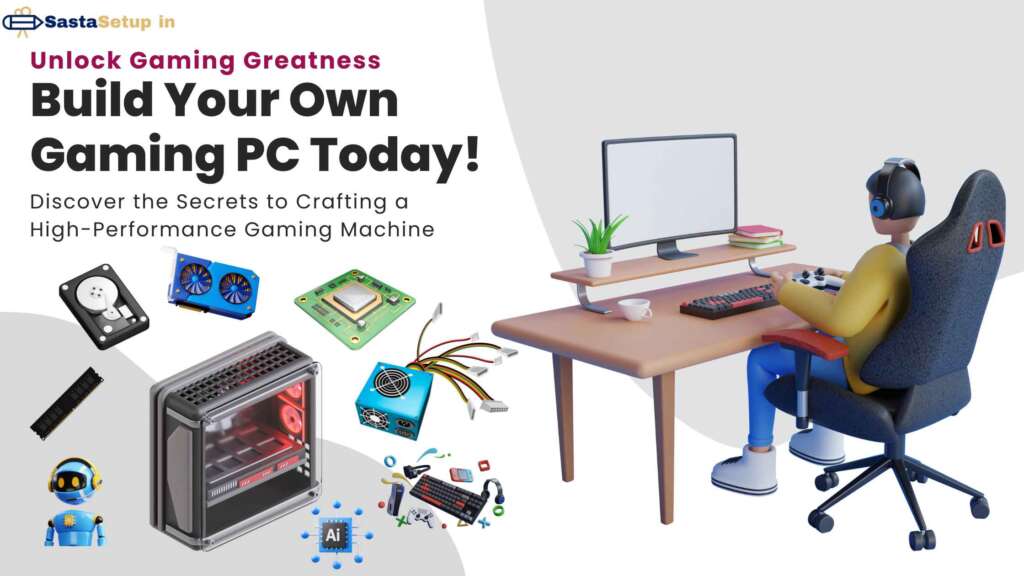Introduction – Gaming PC or PC For Gaming
Building a gaming PC offers an exciting opportunity to create a custom rig tailored to your specific gaming needs and productivity requirements. Whether you’re a passionate gamer or a professional seeking a high-performance workstation, building a gaming PC allows you to handpick the components that will deliver the best performance for your desired tasks. In this comprehensive guide, we will walk you through the step-by-step process of building a gaming PC that strikes the perfect balance between gaming prowess and productivity power.
1. Define Your Goals: Gaming and Productivity Requirements
Before diving into the building process, it’s crucial to identify your specific goals for the PC. Determine whether gaming is your primary focus, and if so, what level of performance you desire for your favorite games. Additionally, assess your productivity needs, such as video editing, graphic design, or content creation, to ensure the PC is equipped to handle these tasks efficiently.
2. Select the Right Processor (CPU)

The CPU is the cornerstone of your gaming PC’s performance, responsible for executing tasks and processing information. For gaming, opt for a powerful processor with strong single-core performance, such as the Intel Core i5 or AMD Ryzen 5 series. If productivity tasks are equally important, consider CPUs with higher core counts, like the Intel Core i7 or AMD Ryzen 7 series, for enhanced multi-threaded performance.
3. Choose the Best Graphics Card (GPU)
The graphics card is the most critical component for gaming performance, directly impacting frame rates and visual quality. Invest in a high-end GPU, like the NVIDIA GeForce RTX 30 series or AMD Radeon RX 6000 series, for a smooth and immersive gaming experience at higher resolutions and graphical settings. Content creators will also benefit from powerful GPUs for rendering and design tasks.
| Image | Items | Links |
 |
Best Graphics Card (GPU)Explore Best e GPU Here. |
4. Opt for Sufficient RAM (Memory)
Having enough RAM is essential for seamless multitasking and smooth performance. For gaming, 16GB of RAM is generally sufficient, but for content creation or productivity tasks, consider upgrading to 32GB or more for better efficiency. High-speed RAM with low latency will further enhance overall system performance.
5. Choose Storage Solutions Wisely
Selecting the right storage solutions is crucial to the overall responsiveness of your gaming PC. Opt for a fast SSD (Solid State Drive) for your operating system and frequently used applications/games to reduce loading times. For additional storage, consider pairing the SSD with an HDD (Hard Disk Drive) for more cost-effective capacity.
6. Invest in a Quality Power Supply Unit (PSU)
A reliable and high-quality power supply unit is essential to ensure the stability and longevity of your gaming PC. Choose a PSU with sufficient wattage to power all your components and leave room for future upgrades. Modular or semi-modular PSUs help maintain a clean and organized interior for better airflow.

7. Focus on Cooling Solutions
Proper cooling is essential for maintaining optimal temperatures during gaming and CPU/GPU-intensive tasks. Consider investing in an air cooler or an all-in-one liquid cooler for your CPU, and opt for GPUs with aftermarket cooling solutions for improved thermal performance and quieter operation.
8. Select the Right Motherboard
The motherboard serves as the foundation for your gaming PC, connecting all components and determining compatibility. Choose a motherboard that supports your chosen CPU and GPU, and provides ample PCIe slots, USB ports, and storage connectors. Consider future expansion and connectivity options when selecting a motherboard.
9. Plan for Expansion
Future-proof your gaming PC by planning for future upgrades and expansion. Ensure your motherboard has available PCIe slots for adding components like sound cards or network cards. Consider a spacious case with room for additional storage drives and cooling solutions to accommodate future needs.
10. Assemble with Care
Assembling your gaming PC requires attention to detail and careful handling of sensitive components. Follow the motherboard’s manual and installation guides meticulously. Take precautions to prevent static electricity discharge and organize cables neatly for proper airflow and aesthetics.
Conclusion
Building a gaming PC is a rewarding experience that enables you to create a custom system optimized for gaming and productivity tasks. By selecting the right components, such as a powerful CPU, high-end GPU, sufficient RAM, and fast storage solutions, you can build a PC that delivers exceptional gaming experiences and boosts productivity for content creation and other demanding tasks. Embrace the freedom of custom PC building, and unleash the full potential of your gaming and productivity endeavors with a PC that perfectly aligns with your needs and preferences.




















Pingback: Realme Pad 2: Why It’s the Best Choice Now in 2024
Pingback: Top 3 Best Headphone for Video Editing and Gaming 2024